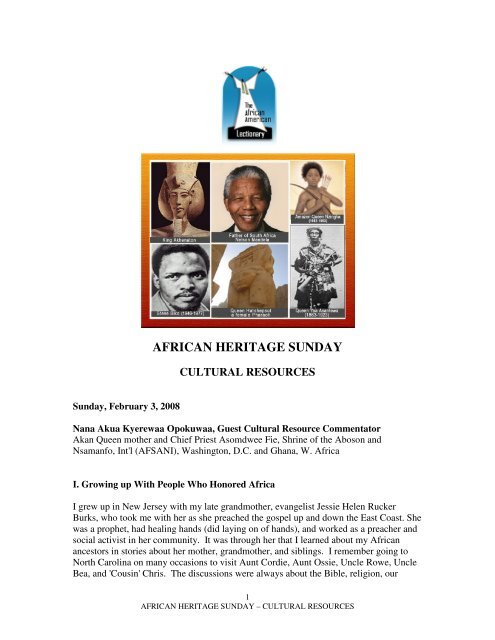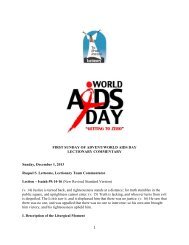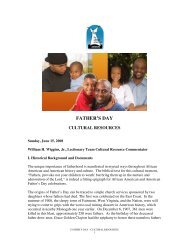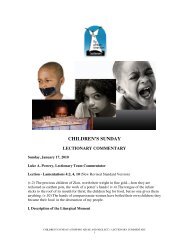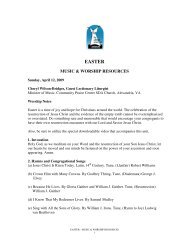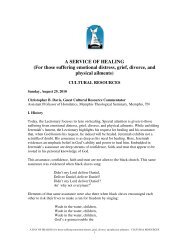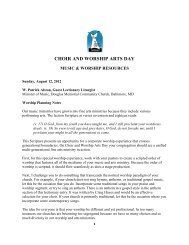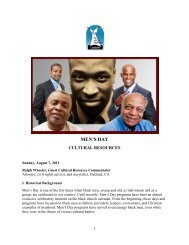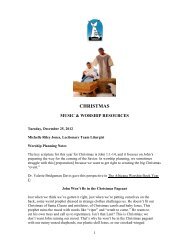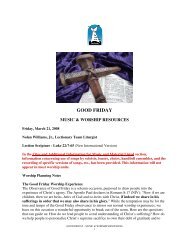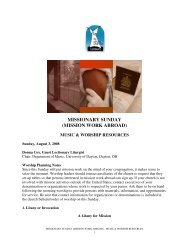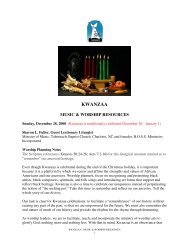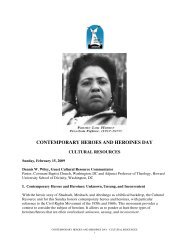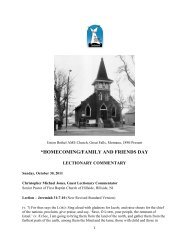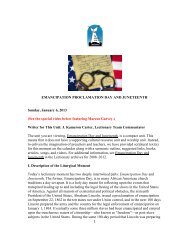AFRICAN HERITAGE SUNDAY - The African American Lectionary
AFRICAN HERITAGE SUNDAY - The African American Lectionary
AFRICAN HERITAGE SUNDAY - The African American Lectionary
You also want an ePaper? Increase the reach of your titles
YUMPU automatically turns print PDFs into web optimized ePapers that Google loves.
<strong>AFRICAN</strong> <strong>HERITAGE</strong> <strong>SUNDAY</strong>CULTURAL RESOURCESSunday, February 3, 2008Nana Akua Kyerewaa Opokuwaa, Guest Cultural Resource CommentatorAkan Queen mother and Chief Priest Asomdwee Fie, Shrine of the Aboson andNsamanfo, Int'l (AFSANI), Washington, D.C. and Ghana, W. AfricaI. Growing up With People Who Honored AfricaI grew up in New Jersey with my late grandmother, evangelist Jessie Helen RuckerBurks, who took me with her as she preached the gospel up and down the East Coast. Shewas a prophet, had healing hands (did laying on of hands), and worked as a preacher andsocial activist in her community. It was through her that I learned about my <strong>African</strong>ancestors in stories about her mother, grandmother, and siblings. I remember going toNorth Carolina on many occasions to visit Aunt Cordie, Aunt Ossie, Uncle Rowe, UncleBea, and 'Cousin' Chris. <strong>The</strong> discussions were always about the Bible, religion, our1<strong>AFRICAN</strong> <strong>HERITAGE</strong> <strong>SUNDAY</strong> – CULTURAL RESOURCES
ancestors, and their stories about plantation life and the changes in the world at that time.I was allowed to sit and listen, quietly. Momma would later ask me questions as we wereriding on the train on the way home, and corrected me when I missed a detail.Much later in life, as a missionary and while holding other offices in church, I began tosee some of the things that she talked about in the traditions and rituals of our services inthe Pentecostal church. Now, as an <strong>African</strong> priest in the Akan Akom Tradition of Ghana,actively researching, studying, practicing and teaching Sankofa <strong>The</strong>ology, andincorporating ancient traditions into contemporary spiritual and religious services, I findthat there is nothing new under the sun. Nor is there a need to limit the movement ofSankofa to culture without including religion. Jesus, during his formative years, throughdivine intervention was exposed to Egyptian traditions and culture (Egypt, North Africa).His experiences, as told in the Bible, were an introduction to religion that is practiced invarying degrees in continental Africa and in the Diaspora. Which brings us to thequestion of what does <strong>African</strong> Heritage have to do with Christianity in the Black Church?<strong>The</strong> answer is everything. If we believe the Biblical stories about our ancestry, then wealso believe that Jesus was the most renowned ancestor in the Christian religion. <strong>The</strong>earlier records about the birth and lives of several prophets in the Old and NewTestaments, place them in Africa. Subsequently, we must consider that because of ourheritage from various parts of Africa, through the Middle Passage, there must berecognition of this within our religious institutions. For those of us living in theDiaspora, we are <strong>African</strong> people who were forcibly migrated to different parts of theworld. In this dispersion and the system of enslavement, we were culturally attacked, andin taking on the cultural aspects of our oppressors, we learned more than languages.Embedded in our lessons were often teachings by our oppressors that were against whatwe have within us. However, the culture that encompasses our sacred systems could notbe destroyed.In an 1832 sermon entitled <strong>The</strong> Religious Instruction of the Negro, Dr. Reverend CharlesColcock Jones reveals his sense that the slave population is without God, and a nation ofheathens, in need of the Gospel. In no way is it revealed that the people who are to beinstructed have anything within them to be cherished and respected. It is as if <strong>African</strong>staken into slavery were empty vessels and being under a complete control of theplantations, provided an optimum opportunity for indoctrination in the ways and rewardsof being a Christian.It is a matter of astonishment, that there should be any objection at all; for theduty of giving religious instruction to our Negroes, and the benefits flowing fromit, should be obvious to all. <strong>The</strong> benefits, we conceive to be incalculably great,and [one] of them [is] there will be greater subordination… amongst theNegroes.Reverend Jones’s sermon reveals an attempt to wipe clean indigenous beliefs andreligious traditions. We know now that in many ways such efforts were not successful.However, some of these ideas have become embedded in the psyche of many <strong>African</strong><strong>American</strong>s of the Christian faith, blocking acknowledgement of our <strong>African</strong> heritage inreligion and spirituality. During the past forty years, many of us have been involved in a2<strong>AFRICAN</strong> <strong>HERITAGE</strong> <strong>SUNDAY</strong> – CULTURAL RESOURCES
eclamation process of activist study, practice, and organizing that has opened newunderstandings of how much we have lost of our <strong>African</strong> past and how much we retainedthat heritage as part of <strong>African</strong> <strong>American</strong> culture.Daily, via our families, communities, religious institutions, and through our habits andrituals, we show that we have maintained parts of our <strong>African</strong> heritage including ancientproverbs, warnings, child-rearing practices, and ways of being in relationships. This is apositive and important thing. Part of the reason for the survival of our <strong>African</strong> heritage inAmerica is the fact that much of what we do that is <strong>African</strong> has not been named. An<strong>African</strong> proverb states, "A log may stay in water for ten years but it will NEVER becomea crocodile." We can celebrate and cherish that which is <strong>African</strong> within us without beingoutside of communion with God because we are children of God.II. I Am An <strong>African</strong> – A MediationThis mediation is written in the characteristic style of <strong>African</strong> Praise Songs that theSouthern <strong>African</strong> recites before a Chief on important occasions. Sometimes a man willsing praises of himself also, telling of some strong personal experience, such as a battle,in former days, while today it might be about working in the mines or a long sojourn in astrange land.I Am An <strong>African</strong>Gabriel Setiloane<strong>The</strong>y call me <strong>African</strong>;<strong>African</strong> indeed am I;Rugged son of the soil of Africa,Black as my father, and his before him;As my mother and sisters and brother, living and gone from thisworld<strong>The</strong>y ask me what I believe . . . my faith.Some even think I have noneBut live like the beasts of the field ....'What of God, the CreatorRevealed to mankind through the Jews of old<strong>The</strong> YAHWEH: IAMWho has been and ever shall be?Do you acknowledge him?'My fathers and theirs, many generations before,Knew him.<strong>The</strong>y bowed the knee to him3<strong>AFRICAN</strong> <strong>HERITAGE</strong> <strong>SUNDAY</strong> – CULTURAL RESOURCES
By many names they knew him,And yet 'tis he the One and only God-<strong>The</strong>y called him:UVELINGQAKI: <strong>The</strong> first OneWho came ere ever anything appeared;UNKULUNKULUL <strong>The</strong> BIG BIG ONE,So big indeed that no space could everContain him;MODIMO: Because his abode is far up in the sky.<strong>The</strong>y also knew him as MODIRIFor he has made all;And LESA: <strong>The</strong> spirit without which the breath of man cannotBe.But, my fathers, from the mouths of their fathers, sayThis God of old shoneWith a brightness so brightIt blinded them... <strong>The</strong>refore ...He hid himself. UVELINGQAKI,That none should reach his presence,Lest they die, (for pity flowed in his heart),Only the fathers who are dead come into his presence.Like little gods bearing up the prayers and supplicationsOf their children to the Great Great God ...III. Ancient And Modern <strong>African</strong>s Have Consistently Worshipped God<strong>The</strong>y worshipped God as the Supreme Being, Great Spirit, the Creator and Sustainer ofall things. Understanding the language and the culture is the key to understanding thereligion. Common beliefs about God among <strong>African</strong>s are: God is self-existent, God is thefirst cause, God is spirit, God never changes, God is unknowable, and God is the Marvelof Marvels. Further, it is important to understand that <strong>African</strong>s use some of the sameappellations for God that we recognize in the Holy Bible. <strong>The</strong> language may be differentand the format may be different since many appellations are spoken in Proverbs that areborne of the experiences of our <strong>African</strong> ancestors with God. Following are examples ofappellations in the language of Twi-speaking peoples of Ghana:Onyankopon, God who alone is great;Odomankoma Oboadee, referring to the creative aspects of God;Totrobonsu, the giver of rain and water;Amowia, the giver of Sun and Light;Atwidiapon, the tree we can lean on that never neither bends nor breaks;4<strong>AFRICAN</strong> <strong>HERITAGE</strong> <strong>SUNDAY</strong> – CULTURAL RESOURCES
Awurade, Our Lord, Our Master;Nyamenekosa, the One in whom I can confide, and more.Examples of some <strong>African</strong> Proverbs are:All wisdom is from God;All things rest with God;God is not asleep;If you want to speak to God, speak to the winds;If God gives you a calabash full of palm wine and a living man kicks it over, Godfills it up again.<strong>The</strong>se are all proverbs that parallel Old and New Testament scriptures.Think about the sayings of the elders in your very own family and community. Some ofmy memories of those sayings or proverbs that my grandmother passed on to me areactually from Africa: Mama said, “Go to bed when it is thundering and lightening, Godis talking, so be still.” “Don't put your hat on the bed, it's bad luck.” “Don't open anumbrella in the house, it's bad luck.” “Don't lay your pocketbook on the floor; you'll loseyour money.” “Cover your head for church or any Spirit can enter you.” “If you makeyour bed hard, you have to sleep in it.” “A hard head makes a soft behind.” “Life is likea boomerang.” “Don't split poles.” “A whistling woman and a crowing hen, ain't nogood.” “Don't walk around the house or outside eating food, it makes the house poor."After investigating these warnings and others, I realized that they were not heridiosyncrasies, but sayings that had been passed down for generations leading right backto the Middle Passage and Africa. I am sure that some of the elders in your congregationcan relate to this form of storytelling and warnings.IV. Another Aspect of Our <strong>African</strong> HeritageOur beliefs surrounding ancestors and reincarnation: Don't we go to the cemetery toplace flowers on special days? Do we not make shrines of places where communitymembers especially children were killed by placing teddy bears, toys, flowers, notes,cards, etc.? Do we not have prayer and candle light vigils or rituals around those sameplaces or other significant locations? What happens when a baby is born and has sometraits that we remember or when the child looks like someone who has died? Don't wesay as we are admiring the baby, "Aw, she/he looks just like Momma, or Uncle (fill in theblank) or Aunt (fill in the blank),” etc. We always point out something about a baby andlater the growing child that is similar to one of our deceased relatives. We are very proudto make these analogies, which have, sometimes, been the source of serious family5<strong>AFRICAN</strong> <strong>HERITAGE</strong> <strong>SUNDAY</strong> – CULTURAL RESOURCES
disputes if everyone is not in agreement, especially the parents who don't necessarilybelieve in "that old stuff.”As we investigate some of the other traditions of spirit possession (Holy Spirit, HolyGhost), music (drums and the penetrating bass guitar lines that call forth the Spirit), Holydance (shouting) baptism (purification), communion (rememberances), offerings(sacrifices), prayer (libation), weddings, funerals, and burials, we clearly recognize thatmany of our contemporary religious rituals directly connect to our <strong>African</strong> heritage.V. LibationHonoring our Ancestors: In order to pour libation as did our <strong>African</strong> ancestors, you willneed a beverage such as wine, palm drink, or water; a glass or small glass pitcher inwhich to place the beverage; and a vessel to pour the beverage into as you are pouringlibation (praying) such as a quart size white or glass bowl, small white basin or a tall orlarge plant. Or, when the weather conditions are conducive, you may pour libationoutside directly into the soil. After libation has been poured into the vessel (if not aplant), the contents should be taken outside and poured near the edifice in soil or on theground to continue the presence of the ancestors and energy that you have called inthrough prayer. <strong>The</strong> oratory sequence for the libations is Invocation, Message,Solicitations, and Curse. Thanks are given at the beginning and the end of all libations.During the invocation, the officiant invokes the forces of beneficence, observing theAkan religious hierarchy where God is the Supreme Being, followed by Mother Earth,the pantheon of lesser gods or spirits, and the ancestors. <strong>The</strong> message segment of libationhighlights the occasion and the purpose of the prayer. In the solicitation portion, thespeaker solicits support for the spiritual, moral, and material well-being of the society(delicate political problems can be mentioned here also). <strong>The</strong> final segment is used for apronouncement of a curse on the forces of evil. End the libation with thanks for the workthat will be done. <strong>The</strong> libation is done in a call and response fashion. <strong>The</strong> officiant saysa line, pours a small amount of the beverage into the vessel, and says, Nsa (come andhave a drink). <strong>The</strong> congregation answers with an affirmative response alternately withsaa (yes) and ampa (true). Or they can simply say, Yes or Amen to affirm theiragreement with the libation. At the end, the cry by the officiant and the congregation isYoooooo to signify that it is finished. Following is a sample libation.INVOCATION:Sample LibationOfficiantCongregationGod, the dependable one. Nsa SaaAsaase Yaa, Mother Earth Nsa AmpaHoly Spirits of the living God Nsa SaaSpirits of all the <strong>African</strong> Clans Nsa Ampa6<strong>AFRICAN</strong> <strong>HERITAGE</strong> <strong>SUNDAY</strong> – CULTURAL RESOURCES
Spirits of all the Ancestors of this Congregation Nsa SaaHere you can allow the congregation to call out names of their belovedancestors, those who have died, and those who lived a good lifecontributing to their family and community. After each name called, asyou can hear it, you say "Nsa.” After a period of time, close it with thefollowing:All of our community ancestors,<strong>The</strong> unborn who are coming back Nsa SaaAnd those whom we forgot to call Nsa AmpaAll the rivers associated with the Clans here Nsa SaaIt is the men and women of valor on whom we callIf you did not lead a worthy life,Your name is not invoked in death!AmpaThanks.For this beautiful day, the blessingsAnd enlightenment that you have afforded us today.Thank you for the newunderstanding of our <strong>African</strong> Heritage andconnection to our religious principles, etc.AmpaSaaSaaAmpaSaaSolicitation:As we offer this drink, we seek life and prosperityWe seek long life and good health, Nsa AmpaYou know the path that we take,Help us to continue along the way Nsa AmpaEtc……Curse:For those who wish to block our pathin this quest for understanding and knowledgeI ask that you intervene and let those balls of confusionbounce back like a boomerang.Reveal who they are and their plan. Nsa SaaRemove them from our way... Nsa AmpaEtc……Final Thanks:And for this prayer and All other blessings, we give thanks. Nsa SaaWe say, Thank You, Thank you, Thank you!YooooooYoooooAMENVI. A List of Traditional Songs7<strong>AFRICAN</strong> <strong>HERITAGE</strong> <strong>SUNDAY</strong> – CULTURAL RESOURCES
<strong>The</strong>se songs may be used to remind us and to acknowledge the traditions and rituals ofour <strong>African</strong> heritage. Most are found in the <strong>African</strong> <strong>American</strong> Heritage Hymnal andother hymnals.Count Your BlessingsI Shall Not Be MovedJesus is on the Main LineGive Me That Old Time ReligionPrecious MemoriesTake Me to the WaterWade in the WaterLibationCultureAncestral venerationTradition and cultureResidual MemoriesBaptism/RitualsBaptism/RitualsVII. Audio Visual Suggestions: <strong>African</strong> proverbs, the Adinkra symbol, and a definitionfor it can be placed on screens. For the symbol, see http://en.wikipedia.org/wiki/Sankofa,http://www.marshall.edu/akanart/akanknow.html, orhttp://africianhistory.about.com/library/bl/blfreestencil-AdinkraSankofal.htm.VIII. Other Cultural Resource InformationSankofa (San=Return or go back; ko=go or return; fa=pick up): As the presentgeneration advances forward into the future, they need to turn back to pick upsome of the good ideas from the past to help them in their present existence.Tradition Remains in the Ear: Tradition remains as each generation keeps andrepeats what it heard from the past.Notes1. Opokuwaa, Nana Akua Kyerewaa. <strong>The</strong> Quest for Spiritual TransformationIntroduction to Traditional Akan Religion, Rituals and Practices. New York:iUniverse Inc., 2005. Online location:http://www.afsani.org/nanakyerewaa/index.html accessed 10 November 20078<strong>AFRICAN</strong> <strong>HERITAGE</strong> <strong>SUNDAY</strong> – CULTURAL RESOURCES
2. Evangelist Jessie Helen Rucker Burks, 1905-1995—the first woman to be ordained asa preacher in the Church of God In Christ—was allowed to preach in the pulpit,continuing her ministry for 64 years until her transition.3. Jones, Charles Colcock. <strong>The</strong> Religious Instruction of the Negroes in the UnitedStates: a reprinting of the Religious Instruction of the Negroe and other works.Commentary by Kamau Makesi-Tehuti. Morrisville, NC: Lulu Press, 2006.4. <strong>The</strong> late Reverend Dr. Gabriel Molehe Setiloane was a Methodist minister; he helpedestablish the Department of <strong>The</strong>ology and Religious Studies at the University ofBotswana and Swaziland (1975-78). Dr. Setiloane is especially noted for hisimportant book <strong>The</strong> Image of God among the Sotho-Tswana (Rotterdam: A. A.Balkema, 1976), an essential work for all students of religious history.9<strong>AFRICAN</strong> <strong>HERITAGE</strong> <strong>SUNDAY</strong> – CULTURAL RESOURCES


